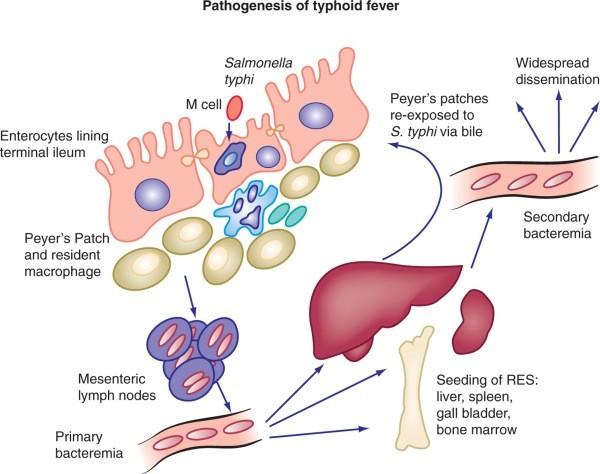Diagnosis And Complications Of Typhoid. In Indonesia, the examination of Wal (serology test to detect the presence of salmonella bacteria) is still a major benchmark to determine the diagnosis. In fact, a positive Wal test result does not necessarily mean the patient must have been contracted typhus (tipes).
 |
| Diagnosis And Complications Of Typhoid |
This is because in areas of endemic such as Indonesia, everyone has been exposed to Salmonella thyphosa. The body had formed antibodies against these bacteria. That's why, when an examination is performed, Wal in the body's antibodies will give a positive reaction. However, this does not mean you positive contracted typhoid.
In addition to the tests, there are also tests Wal who more accurately detect the typhus, that tests TUBEXR. This immunological tests performed using colored particles to increase sensitivity.
Typhoid is diagnosed by analyzing samples of blood, urine, or stool in the laboratory.In addition to these reviews, the accuracy of a diagnosis can also be made by examining a sample of spinal fluid. However, this test is only used if the other inspection does not bring the results convincing. A long time and the pain inflicted makes this test less frequently performed.
If you positively contracted typhus, it is worth to other family members checked to detect the possibility of contagion.
Complication Of Typhus
About 10% of people with typhoid (tipes) suffered complications. Complications occur when people with typhoid late or not treated with antibiotics appropriately.Complications occur, on average, three weeks after infection. The most common complication is the digestive system bleed in and infections that spread to the surrounding tissues to cause intestinal or digestive system breaks.
Symptoms Of Bleeding In The
People with typhoid who experience bleeding in the typically feel symptoms such as feeling tired all the time, shortness of breath, vomiting blood, pale skin, irregular heartbeat, black stool and concentrated.
Generally the bleeding in result of typhoid are not life threatening. However, a blood transfusion is needed to replace the loss of blood from the body. Surgery may also be needed to repair the damage to the area of bleeding.
Luka on the walls of the digestive system
Perforation occurs when the walls of the digestive system unharmed and a hole was formed so that the contents of the gastrointestinal tract can spill into the abdominal cavity. Unlike skin, stomach lining called peritoneum does not have a defense mechanism against infection. Then the patient lives will be threatened when thetyphoid causing bacteria to spread and infect the abdominal peritoneum. This condition is known as peritonitis.
Peritonitis is a disease which is critical because of the peritoneum normally sterile andfree from germs. In this situation, the infection can spread quickly through the bloodto other organs. This infection may lead to various organs stop functioning, even bring death if not promptly treated.
This complication suffered by about five percent of people with typhoid. Perforation is marked by a drop in blood pressure suddenly, followed by the presence of blood in the stool. Another symptom is abdominal pain that is increasingly deteriorating.
In the hospital, people with peritonitis will be treated with injections of antibiotics before surgery to close a hole on the wall of the intestine.










Posting Komentar